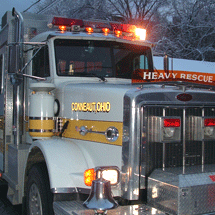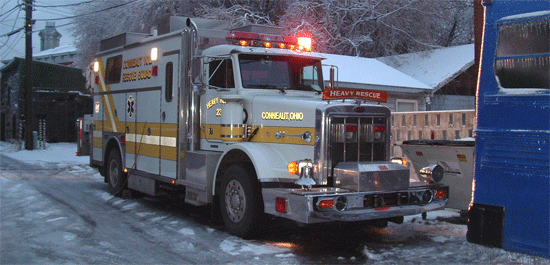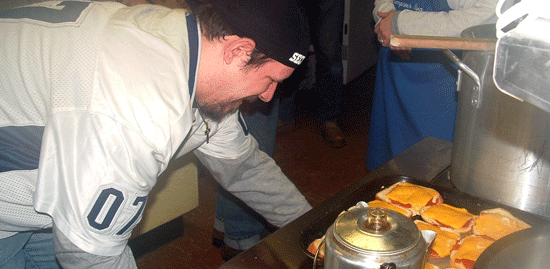 |
melting the ice
by Tim Byers
Find out more about Free Will Baptist Master's Men, visit www.fwbmastersmen.org.
|
Preparation
For several years, I have been part of the local volunteer fire department. My coworkers always stress the importance of being prepared for an emergency—especially the first 72 hours. I have always tried to do this personally, but recently a conversation with the local battalion fire chief made me realize that our little church could also make some basic preparations that would cost little, but would make a big impact in a dire emergency.
With the help of our church Master’s Men group, we started preparing our church to face an emergency. During the summer of 2007, we began a weekly fellowship meal before the Wednesday night service. After a few weeks, we began to keep more than enough food and beverage for the week.
We planned our menu weeks in advance, serving food like pasta, hotdogs, and pancakes for an average of 65 cents per person. Using donations from the church, we bought food in bulk, and began to keep four to six weeks worth of meals on hand (approximately 800 meals). Buying in bulk was not only cheaper, but it allowed us to keep a supply of food in case of a community emergency.
Sometime earlier, a donor had given the church 50 cots for people to sleep on. The only thing the church lacked to be fully prepared for a major emergency was a power generator.

Devastation
The storm came like most storms. No one predicted that it would be as bad as it was. After all, in Ashtabula, Ohio, snow is no big thing. On more than one occasion, it has snowed more than a foot during a church service!
But this was no snowstorm. It was an ice storm—one of the worst in the history of the community. It brought down thousands of power lines and snapped trees like toothpicks. Ice on the power lines measured over 2 inches thick. The utter devastation was amazing.
Local police and fire departments received hundreds of calls during the first 12 hours after the storm. Falling power lines causes dozens of small fires across the city. The street department had all crews out, the police department had every officer on patrol, and the fire department called in all personnel to respond to hundreds of emergency calls. Their efforts simply were not sufficient.
The entire community and many of the surrounding areas had no power. After 12 hours without heat, it became apparent this was a full-fledged emergency. In sub freezing temperatures, homes were quickly growing cold, and the power company estimated that it would be three days before power would be restored to our town.
No one could buy food. Restaurants and stores were closed. The situation began to get desperate. The chief shared his plans to set up a generator-powered shelter at the fire station. However, emergency personnel were already running short of food. They were accepting people into the shelter, but they had nothing to feed them. He asked if we could help.
With gas appliances, we were able to cook and deliver food for 125 people to the fire station in one hour. The months of preparation and training paid off. We not only had the supplies ready, but we were able to prepare the meal without power and deliver it in an hour!
Another problem soon became apparent. The small fire department was simply not big enough to serve as the lone shelter in town. Because the roads were impassable, people were stranded. The church quickly agreed to keep anyone who did not need immediate medical attention.
While we were able to cook meals, we had no power ourselves. Eighteen hours into the power outage, the temperature was plunging, and the church was getting very cold.
A generator large enough to power a church is not easy to find, so the fire department allowed us to use a heavy rescue truck with a 20 kw generator. With extension cords, an electrician from our church wired the truck into the church. The result was amazing. The lights from the building and the truck lit up our community like a beacon in the cold darkness.

People began to stream into the church when they saw the lights. Their relief was written across their faces when they felt the heat and sat down with a steaming cup of coffee. I don’t think coffee ever tasted so good.
Church members prepared supper for everyone who came. After dinner, we ate popcorn, and the kids watched a movie while the adults sat and talked. We found it amazing that in such an emergency, no one seemed like a stranger.
Several families stayed in the church that night. The babies slept in the nursery. Some used the old sofas in the teen room. Others used the cots, and of course some slept on pews.
Inspiration
Our church has always wanted to serve the community. Some simple preparations enabled us to meet a vital need during an emergency. We did not know what emergency we might face, but we were ready…just in case.
It took training and practice in order to meet the needs of those who walked through our doors that night seeking shelter. But we thank the Lord that we were prepared to serve, that our church became the beacon of hope to our community in its time of need.
From the Master’s Men group in our church who took care of the building to the ladies in the church who cooked and worked overtime to make our guests welcome, everyone pitched in to “melt the ice” in our town. Only God knows what impact their service will have on those in the community around us.
ABOUT THE WRITER: Tim Byers is a home missionary in Ashtabula, OH. He and his wife Lori have five children. Learn more about their church at www.lighthousefwb.org. To learn more about Free Will Baptist Home Missions, visit www.homemissions.net.
|

